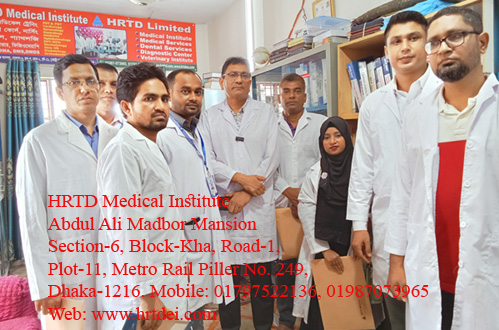Psychotherapy Course/Mental Therapy Course Details
Psychotherapy Course. Mobile Phone No. 01797522136, 01987073965. Psychotherapy Courses of HRTD Medical Institute are Post Diploma Training in Psychotherapy 6 Months, Post Diploma Training in Psychotherapy 1 Year.

Weekly Class System. Friday, Monday, and/or Saturday. The 6-month course Fee is Tk 35500/-, and the 1-year course Fee is Tk 70500/-. These Courses are very important nowadays because Psychiatric Patients are increasing day after day in the world.
Subjects for Psychotherapy Courses/Mental Therapy Course
Subjects for Psychotherapy Courses are:
- Neuro Anatomy and Physiology
- Anatomy of the Brain
- Functional Area of the Brain
- Common Mental Diseases
Summary of neuroanatomy & physiology
Neuroanatomy of physiology is the study of the structure & function of nervous system.
Classification of Psychiatric Disorders
General Psychopathology-1
General Psychopathology-2
Clinical Psychopathology
Psychiatric Nursing-1
Psychiatric Nursing-2
Assistance in Psychotherapy
Location of Psychotherapy Courses/Mental Therapy Course
Location of Psychotherapy Courses. Mobile Phone No. 01797522136, 01987073965. HRTD Medical Institute, Abdul Ali Madbor Mansion, Section-6, Block-Kha, Raod-1, Plot-11, Metro Rail Piller No. 249, Mirpur-10 Golchattar, Dhaka-1216.

Psychotherapy Course Fee/Mental Therapy Course Fee
Psychotherapy Course Fee. Mobile Phone No. 01797522136, 01987073965. Psychotherapy 6 Months Course Fee Tk 35500/-, and Psychotherapy 1 Year Course Fee Tk 70500/-. Admission Fee Tk 15500/- and Tk 25500/- and the rest monthly payable.
Psychotherapy and Other Courses of HRTD Medical Institute
Paramedical Course, Diploma Medical Assistant, Diploma in Medicine & Surgery, DMDS 4 Years, Diploma in Paramedical, Post Diploma Training in Medicine, Post Diploma Training in Gastrology, Post Diploma Training in Cardiology, Post Diploma Training in Gynecology, Post Diploma training in Diabetology, Post Diploma Training in Dermatology, Post Diploma Training in Endocrinology, Post Diploma Training in Psychotherapy, Post Diploma Training in Psychology, Post Diploma Training in Pediatrics, Post Diploma Training in Gynecology and Obstetrics, Post Diploma Training in Skin VD, Post Diploma Training in Orthopedics, Post Diploma Training in Ophthalmology, Post Diploma Training in ENT, etc.
Common Mental Diseases/ Psychiatric Diseases
Common Mental Diseases. Mobile Phone No. 01797522136, 01987073965. Depression, Anxiety neurosis, Hysteria, Obsessive Compulsive Disorder, and Schizophrenia.
Definition of Psychiatry
Psychiatry is the branch of medicine that deals with the diagnosis treatment prevention of behavioral disorders.
Definition of Mental Hygiene in Psychotherapy Course
The application of scientific principles and practices for the preservation and development of mental health and prevention of mental disorders.
মানসিক স্বাস্থ্য সংরক্ষণ এবং বিকাশ এবং মানসিক ব্যাধি প্রতিরোধের জন্য বৈজ্ঞানিক নীতি এবং অনুশীলনের প্রয়োগ।
What is the relation between mental and physical disease?
There are three types of relation between physical and psychiatric disorders can be seen.
- Patients with Psychiatric problems can present physical manifestations. e.g. abdominal pain in IBS.
- Psychiatric problems can be part of a physical complex. e.g. depression in hypothyroidism.
- Patients with established psychiatric disorders can develop physical diseases. e.g. depression causes peptic ulcer disease.
Classification of Psychiatric Disorders/Mental Disorders
- Stress-Related Disorders: Acute Stress Disorder, Adjustment Disorder, Post Traumatic Stress Disorder
- Anxiety Disorders: Generalized Anxiety, Phobic Anxiety, Obsessive Compulsive Disorder
- Mode Disorders: Depressive Disorder, Mania, and Bipolar Disorder
- Schizophrenia and Delusional Disorders
- Substance Misuse; eg. Alcohol, Drugs
- Organic; eg. Delirium, Dementia
- Disorders of Adult Personality and Behavior; eg. Personality Disorder
- Eating Disorders; Anorexia nervosa, Bulimia nervosa
- Somatoform Disorders; eg. Somatisation Disorder, Pain Disorder, Somatoform Autonomic Dysfunction
- Neurasthenia
- Sexual Disorder; eg. Premature Ejaculation, Vaginismus, etc.
- Puerperal Mental Disorders; eg. Puerperal Psychosis.
Mention the causes of mental illness
There are many known factors responsible for mental disorders.
- Heredity: Heredity may be an important factor in some cases. For example, the child of two schizophrenic parents is 40 times more likely to develop schizophrenia than is the child of healthy parents.
- Congenital: Birth injury, neonatal asphyxia, rubella or measles infection, and nutritional deficiency of the mother during gestation.
- Certain disease:
- a) Organic brain disease: e.g. Vascular disease, Cerebral artery sclerosis, Neurologic disseminated sclerosis, Neoplastic disease.
- b) Endocrine and metabolic diseases: e.g. Diabetes, Hyperthyroidism, Hypothyroidism
- c) Certain chronic diseases: Tuberculosis, Leprosy, Syphilis.
- Nutritional deficiency: Iodine, Iron, and vitamin B complex deficiency.
- Toxic substances: Neuro-toxic substances such as
- a) Hg, Mn, Pb, As, Alcohol, etc.
- b) Psychotropic drug: tranquilizer, barbiturates & griseofulvin
- c) Drug abuse.
- Trauma: Head injury or other traumatic injuries.
- Social cause: It includes behavioral anomalies of man and to man while living in society such as worries, anxieties, emotional stress, tension, unhappiness, marriages, broken homes, poverty, changing family structure, etc.
Depression in Psychotherapy Course
What is depression?
It is a syndrome characterized by low mood, lack of enjoyment, reduced energy, and change in appetite, sleep, and libido.
এটি একটি সিনড্রোম যা নিম্ন মেজাজ, উপভোগের অভাব, শক্তি হ্রাস এবং ক্ষুধা, ঘুম এবং কামশক্তির পরিবর্তন দ্বারা চিহ্নিত করা হয়।
Mention the causes of depression
Not clearly known but the following predisposing causes may be responsible-
- Heredity is an important factor
- Constitution: These patients are of pyknic built, obese, and their muscular development is poor.
- Exposure to stress
- Organic disease e.g. various viral diseases, cardiovascular disease, anaemia, etc.
Mention the clinical features of depression
Clinical features of depression–
Psychological
- Depression mood
- Reduced self-confidence
- Pessimism
- Guilt
- Loss of interest
- Loss of enjoyment
- Loss of libido
- Suicidal thinking
মনস্তাত্ত্বিক
- বিষণ্ণ মেজাজ
- আত্মবিশ্বাস কমে গেছে
- হতাশাবাদ
- অপরাধবোধ
- আগ্রহের ক্ষতি
- উপভোগের ক্ষতি
- কামশক্তি হ্রাস
- আত্মঘাতী চিন্তা
Somatic
- Reduced appetite
- Weight change
- Disturbed sleep
- Bowel disturbances
- Retardation
- Premature ejaculation in male
Treatment of depression in Psychotherapy Course
Treatment of depression
General management
- If suicidal attempt then hospitalization
- Nutritious diet & management of malnutrition & obesity
- Family & social support
- Change of place or tour.
Medication
- Antidepressant: e.g. Amitriptyline psychotherapy
Anxiety Neurosis in Psychotherapy Course
What is anxiety neurosis?
This is the most common form of psychoneurosis characterized by a lack of concentration, loss of interest & unforeseen fears due to adaptation to environmental stress.
Mention the causes of anxiety neurosis
Causes of anxiety neurosis
- Many patients appear to have personality traits of high anxiety and poor tolerance of stress.
- Stress
- Unexpected life events that the patient cannot handle. e.g. death of beloved person.
- Unexpected disasters such as floods, accidents & terrorist activities.
- Sexual background
Clinical features of anxiety neurosis in Psychotherapy Course
Clinical features of anxiety neurosis
Psychological
- Apprehension
- Unforeseen fears
- Irritability
- Lack of concentration
- Loss of interest
Somatic
- Tremor
- Sweating
- Palpitations
- Chest pain
- Breathlessness
- Headache
- Dizziness
- Diarrhea
- Frequency of micturition
- Insomnia
Treatment of anxiety neurosis in Psychotherapy Course
Treatment of anxiety neurosis
General management
- Explanation and reassurance
- Specific relaxation techniques should be taught
- Change of place may be effective
Medication
Antidepressants: e.g. Amitriptyline, propranolol, phenelzine, etc.
Hysteria in Psychotherapy Course
What is hysteria?
Hysteria is a complex neurosis in which psychological conflict is turned into physical symptoms, such as sensory loss & abnormal motor activity that have no underlying physical cause.
Clinical features of hysteria
Clinical features of hysteria
- Onset usually before the age of 35 years
- More common in female
- Abnormal motor activity
- Non epileptic seizure
- Abnormal gait & movement
- Weakness & tremor of limbs
- Sensory loss
- Loss of consciousness
- Visual disturbance. e.g. loss of vision, double vision, etc.
- Loss of hearing
- Aphonia
- Amnesia
- Symptoms last for a short period & patient recovers rapidly
Treatment of hysteria
Treatment of hysteria
a)General management
- Reassurance
- Explanation of the symptoms of the disease
- Advice to avoid stressful social problems
- Correction of causative factors
- Encouragement of normal behavior with the patient
b)Mediation: Usually medication is not required for the case. But in some cases, drugs are used to correct some psychological problems. e. g. Antidepressant drugs.
Differentiate between hysteria and epilepsy
Difference between hysteria & epilepsy
| Sl | Traits | Hysteria | Epilepsy |
| 01. | Patient profile | Usually occurs in young female | In any sex and at any age |
| 02. | Place of attack | Usually in presence of family members | At any place |
| 03. | Time of fit | Never during sleep | At anything |
| 04. | Duration of fit | Longer | Usually shorter |
| 05. | Loss of consciousness | Not real | Real |
| 06. | Movement of the limbs | Present but variable | Present with typical characteristics |
| 07. | Tongue bite | Absent | May be present |
| 08. | Incontinence of urine & faces | Absent | Present |
| 09. | Frothing at mouth | Absent | Present |
| 10. | Resistance to eyelid opening | Present | Absent |
| 11. | Eyeballs | Rolling | Fixed |
| 12. | Similarity of fits | Different in each situation | Same in each situation |
| 13. | EEG finding | Normal | Typical findings |
Neuro Anatomy and Physiology for Psychotherapy Course
Neuroanatomy is a branch of Anatomy that focuses on the study of the structure of the Nervous System, Organs of the Nervous System, Tissues of the Nervous System, Cells of the Nervous System, Brain, Spinal Course, Cranial Nerves, Spinal Nerves, Sensory Nerves, Motor Nerves, Sensory Neuron, Motor Neuron, etc. Neuro Physiology is a branch of Physiology that focuses on the functions of the Nervous System, Organs of the Nervous System, Tissues of the Nervous System, Cells of the Nervous System, Brain, Spinal Course, Cranial Nerves, Spinal Nerves, Sensory Nerves, Motor Nerves, Sensory Neuron, Motor Neuron, etc.
Anatomy of the Brain for Psychotherapy Course
Anatomy of the Brain. Mobile Phone Number. 01797522136, 01987073965. The Brain is the Chief Coordinator of the Body and Mind. The brain is divided into two parts. The Right Brain, and the Left Brain. Each Part of the brain consists of some lobes. The lobes are The Frontal lobe, The Parietal lobe, The Occipital lobe, and The Temporal lobe. Every lobe consists of some segments.
 MATCDHAKA – Medical Assistant Training Centre in Dhaka Pharmacy, Veterinary, Dental, Nursing, Pathology, Physiotherapy and Homeopathy Training Institute in Dhaka
MATCDHAKA – Medical Assistant Training Centre in Dhaka Pharmacy, Veterinary, Dental, Nursing, Pathology, Physiotherapy and Homeopathy Training Institute in Dhaka



